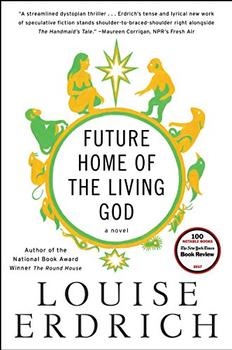Summary | Excerpt | Reading Guide | Reviews | Beyond the book | Read-Alikes | Genres & Themes | Author Bio

The science of robotics has a hypothesis called "uncanny valley" which states that people are comfortable with "cute" robots (think R2D2) but as the machines start to look more like humans, the uneasiness factor increases. This queasiness quotient is also why California makes your skin crawl.
The dystopia that debut author Edan Lepucki imagines is not some outlandish Hunger Games-like landscape. Instead it is a setting that looks and feels very much like ours. The natural disasters that are glancingly mentioned read like logical extremes of what's already unfolding around us: wildfires in Colorado and Utah, and wild snowstorms across the Midwest and the east coast. These massive disasters have been enough, however, to push society over the tipping point. Los Angeles has gone to hell in a handbasket and even the most basic supplies are hard to come by. Cal Friedman and his wife, Frida, escape from the grim landscape of the city of angels, deep into the California wilderness.
For his part, Cal's education at a unique liberal arts college called Plank (modeled after Deep Springs College in California) has prepared him for some of this. He can work the land to coax food from it and keep shelter above their heads. It was also at Plank that Cal and Frida came to know each other through Micah Ellis - Frida's brother who was Cal's roommate. Their escape away from L.A. carries special significance for Frida because she's hoping to leave behind a terrible incident from the past – Micah became a suicide bomber and killed himself. Things get complicated when Frida becomes pregnant. Life suddenly becomes not only about the present, but also about the future.
A trader, the sole visitor the couple receives monthly, and with whom they barter supplies, lets Frida and Cal know there are people, community, just beyond their immediate reach. Their hunch is proved correct - but the new people are not quite welcoming, warm and fuzzy. There's something just a little off about this community. What exactly is wrong here? What will it take to survive with these people on "the Land?" Is such a compromise even worth it? Were they better off alone? These are the questions that Frida and Cal will have to ask themselves.
Having followed Edan Lepucki's writing career for a while now, it was hard not to come to California without any pre-existing bias. A recipient of the famed "Colbert bump," Lepucki might be realizing that the spotlight can be a good thing for sales but it can also be harsh. It's easy to see where the not-so-savory reviews might be coming from: the head honcho of "The Land" often comes across as caricature. The plotline also drags in quite a few places. As individuals, even Frida and Cal remain static until the very end; there's practically no character growth even as their marriage starts to fray.
For some, the dystopia might not be "dystopian" enough - the disconnect between what we know and what Lepucki imagines coming across as incongruous at best. Yet there's plenty to root for in California. It is chilling precisely because so much of it feels so real - and so darned close. It doesn't take a wild stretch of the imagination to know that such a life might be waiting for us just around the corner. A box of Hershey's chocolate powder means nothing much to us really, but Frida's outsized reaction at seeing one on "The Land", is movingly executed. As California efficiently shows, extreme scarcity can reinvent the rules; it can make feral beings out of all of us. Think the meek shall inherit the earth? Well, don't count on it.
![]() This review was originally published in The BookBrowse Review in August 2014, and has been updated for the
August 2015 edition.
Click here to go to this issue.
This review was originally published in The BookBrowse Review in August 2014, and has been updated for the
August 2015 edition.
Click here to go to this issue.

If you liked California, try these:

by Rumaan Alam
Published 2021
A magnetic novel about two families, strangers to each other, who are forced together on a long weekend gone terribly wrong.

by Louise Erdrich
Published 2018
A startling portrait of a young woman fighting for her life and her unborn child against oppressive forces that manifest in the wake of a cataclysmic event.
Your guide toexceptional books
BookBrowse seeks out and recommends the best in contemporary fiction and nonfiction—books that not only engage and entertain but also deepen our understanding of ourselves and the world around us.